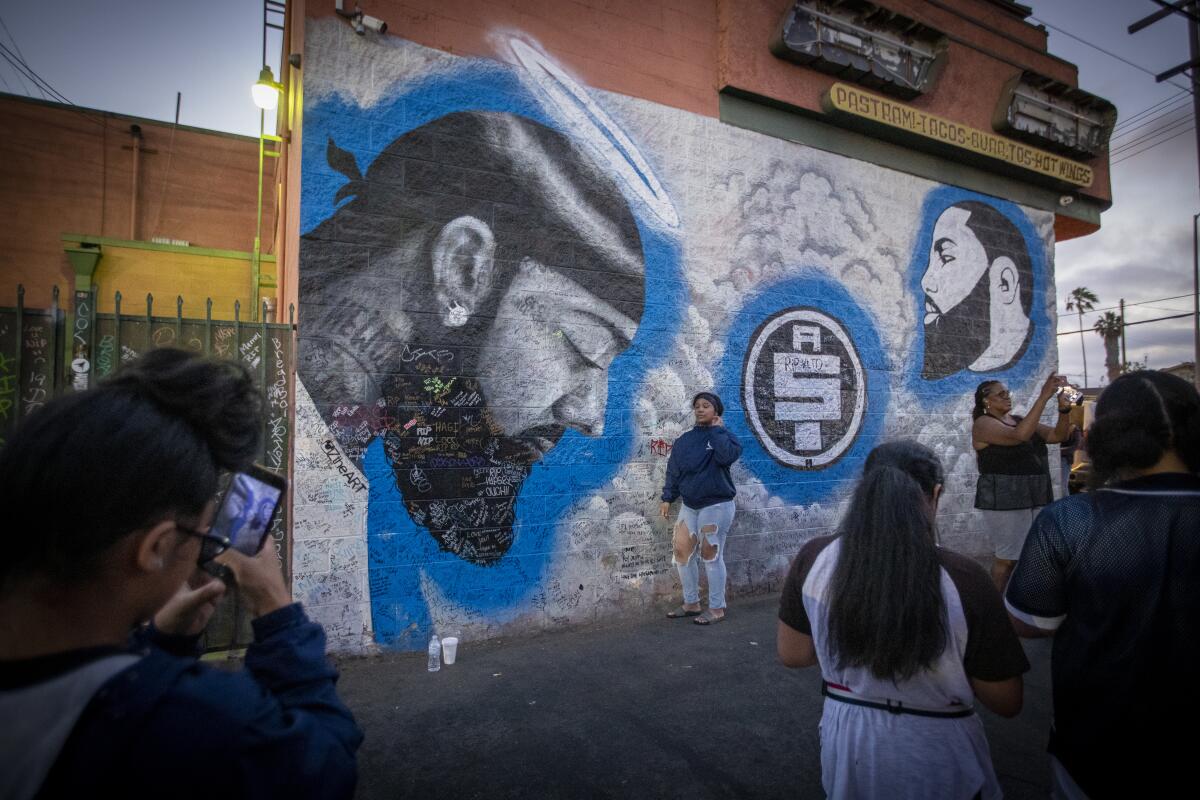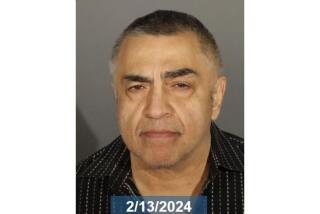Trial begins for man accused of killing beloved L.A. rapper Nipsey Hussle

The day they spoke in a Crenshaw parking lot, Nipsey Hussle and the man who shot him to death saw their “arcs in life were bending in different directions,” a Los Angeles County prosecutor said Wednesday.
Hussle — born Ermias Asghedom — was a year removed from releasing his Grammy-nominated album “Victory Lap” and was gaining a reputation as a community hero trying to reinvest in the neighborhood where he grew up. He’d opened up his Marathon Clothing store, helped found a co-working space and ultimately purchased the plot of land he was standing on the day he was shot.
Eric Holder Jr., 33, also was an aspiring rapper, but one who was “not nearly as successful, not nearly as respected” as Hussle, Deputy Dist. Atty. John McKinney said during his opening statement in Holder’s murder trial.
Despite coming from the same neighborhood and growing up in the same gang, the notorious Rollin’ 60s set of the Crips, the two men had “little in common,” McKinney said. Until their lives became inextricably linked, when Holder produced two handguns and took the ascendant rapper’s life in March 2019.
More than three years after that deadly confrontation, Holder appeared in court Wednesday for the start of his trial. If convicted as charged of murder and attempted murder, he faces a de facto life sentence.
Late Wednesday morning, L.A. County Deputy Public Defender Aaron Jansen admitted during his opening statement that his client had killed Hussle. But he said the attack was a crime of passion, rather than premeditated murder.
Wearing white sneakers and a navy suit that couldn’t entirely hide his neck tattoos, Holder kept his eyes forward and betrayed little emotion as his lawyer casually acknowledged he’d killed a man.
Jansen has previously said he believes the case is “overcharged,” and he has disputed the validity of the attempted murder counts against Holder for the shootings that same day of two other men in the parking lot. They survived the attack.
The case will last about two weeks, according to McKinney, who said he expects to call about 15 witnesses.
Holder was among several people who had spoken to Hussle that day outside his store. Although prosecutors have described their interaction as brief and calm, Hussle raised a topic that can often prove deadly in South L.A — snitching.
Herman Douglas, a former Rollin’ 60s member and longtime friend of Hussle’s who worked at Marathon, testified Wednesday that Hussle was trying to warn Holder there were rumors he had worked with police, the kind of gossip that could quickly turn deadly.
“He told him friend to friend, I heard there’s some paperwork floating around, I ain’t read it, take care of it,”
Hussle said, according to Douglas, who wore both a jacket and a shirt bearing the rapper’s face as he took the stand.
In a recent interview, McKinney declined to say whether there was any truth to the rumor that Holder was a police informant. But Jansen said Wednesday that Hussle’s comment left Holder “so enraged and triggered” he did not stop and consider his actions before returning to the parking lot and opening fire with two handguns.
During his opening statement, Jansen began displaying images of informants meeting grisly fates in mob movies such as “The Godfather Part II” and “Scarface,” attempting to demonstrate the fear Holder might have felt after Hussle suggested he had snitched. But L.A. County Superior Court Judge H. Clay Jacke stopped Jansen’s presentation after an objection from McKinney.
Hussle was shot 10 times and died a short time later. Kerry Lathan, 56, and his 44-year-old nephew, Shermi Cervonta Villanueva, were wounded but survived, McKinney said.
On Wednesday, McKinney described Hussle’s “devastating injuries.” While Hussle’s official cause of death is listed as gunshot wounds to the head and torso, McKinney said Wednesday that a bullet “transected” Hussle’s spine, meaning even if he had survived, he would have been paralyzed for the rest of his life.
Holder was arrested two days after the shooting when a woman who served as his getaway driver turned herself in to police. McKinney identified the woman publicly for the first time Wednesday as Bryannita Nicholson, a caretaker and ride-share driver who had become smitten with Holder in the month before the shooting.
The prosecutor painted her as unwitting accomplice who has cooperated with police in spite of gangland threats to her safety. McKinney said Nicholson did not even realize Hussle had been shot until the day after she drove his killer away from the crime scene. She is expected to be a key witness during the trial.
McKinney told jurors to expect much of the case to center on gang culture and the issues of snitching and respect. He also warned that some of the witnesses he plans to call, including those who survived the shooting, are likely to be combative and uncooperative on the stand.
“Respect is everything. Reputation is everything. It’s a different play on respect than you’re used to,” McKinney said, referring to the rules Hussle and Holder would have lived by in the Rollin’ 60s Crips. “It’s kind of a perverse definition of respect … a lot of blood has been shed, not only in that gang, but in gangs across the county, over this concept of respect.”
The rapper never shied from his gang affiliation. Hussle shouts out the Rollin’ 60s in the intro to his breakthrough 2013 mixtape, “Crenshaw,” and said in a 2014 interview that he joined the gang as a teenager.
Douglas, who also goes by the nickname Cowboy, said Holder and Hussle became affiliated with the Rollin’ 60s at a young age. Despite his gang affiliation and his fame, Hussle would often go to whatever neighborhood he pleased without a security detail, Douglas said. He also dismissed the idea that the mere implication Holder had snitched should have left him in fear for his life.
“Nowadays there’s so many snitches walking around … that’s a myth,” Douglas said. “You could walk out [of] a gang right now. We don’t care if you walk out of the Rollin’ 60s, we ain’t gonna do nothing to you.”
Jansen, who has previously noted that his client may have struggled with mental health issues, said Holder had checked himself into a mental health facility hours before he was arrested by L.A. County sheriff’s deputies.
Although Holder’s trial is expected to draw significant media coverage, the proceedings are of little interest to those in the neighborhood that Hussle’s death affected most. The courtroom on Wednesday was largely filled with media members, interns from the district attorney’s office and a visiting group of law students from Morehouse College.
No one from Hussle’s family was present, and friends of his have said they’re more focused on growing his legacy in the community than they are the fate of the man who killed him.
“Court trials and murder cases ain’t scarce around here, sad to say,” LaTanya Ward, a friend of Hussle, told The Times last month. “The death of Black folks’ futures is aplenty, both by death and the ‘injustice’ system.”
More to Read
Sign up for Essential California
The most important California stories and recommendations in your inbox every morning.
You may occasionally receive promotional content from the Los Angeles Times.











